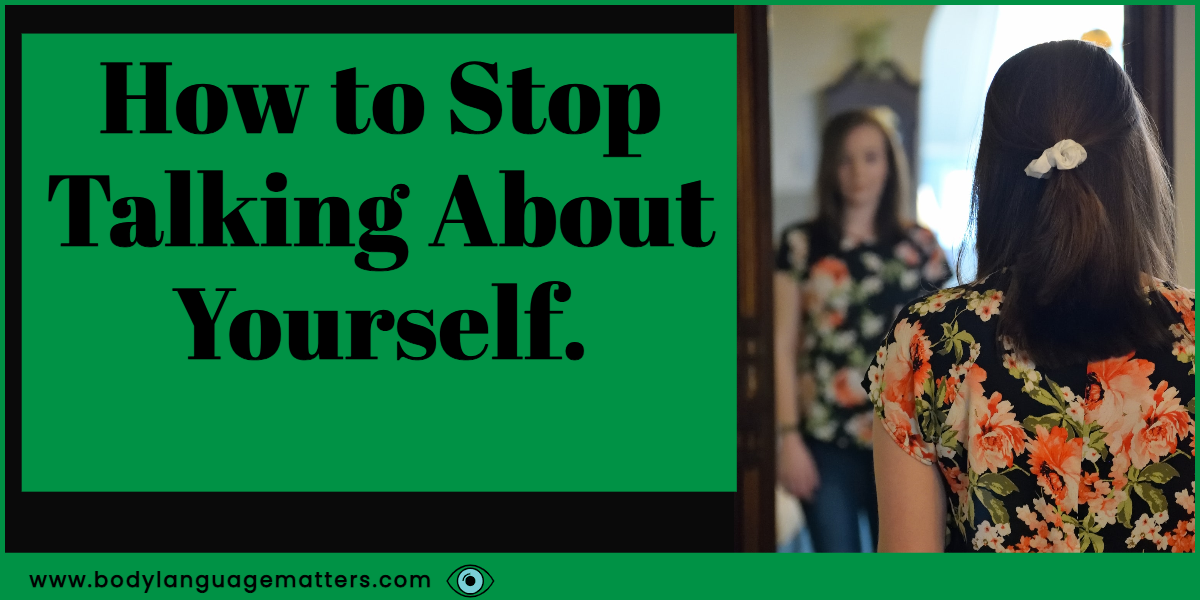When it comes to talking about yourself there are plenty of tips and tricks you can use in the post we figure out the best and how to implement them.
Talking about yourself can be a tricky habit to break. The key is to become aware of when you’re doing it and actively try to refocus the conversation onto someone else. Try asking questions about the other person, such as “How has your week been?” or “What do you think?” This will help take the focus off of you and onto the other person.
Try to practice active listening. This means paying attention to what they are saying without trying to think of how it relates back to yourself. It is also important to recognize that talking about yourself in conversations is not always negative; however, if you find it is taking away from having meaningful conversations with others, then it may be time to refocus on engaging with others in a more meaningful way.
7 Ways To Stop Yourself From Talking About You.
- Listen intently and ask people questions.
- Give compliments instead of talking about yourself.
- Practice mindfulness and observe your thoughts.
- When you feel the urge to talk about yourself, redirect the conversation to the other person.
- Be aware of the topics you’re passionate about and try to avoid them.
- Make a conscious effort to talk about things that involve other people.
- Don’t say anything at all keep silent.
How To Stop Talking About Yourself
If you find yourself talking about yourself too much, there are a few things you can do to stop talking. Firstly, be aware of the conversations you’re having and when you start to talk more than is necessary, try to pause and ask the other person something about their life or interests instead.
Secondly, focus on listening more than talking – actively listen to what the other person is saying and take an interest in them. This will help to keep the conversation balanced and prevent you from continuously rambling about your own experiences.
Finally, if you really feel like you’re struggling to break the habit of talking about yourself too much, try writing down your thoughts in a journal instead so that it doesn’t impact on your conversations with others.
By following these steps, you should be able to reduce the amount of time spent talking about yourself and make sure that each conversation is meaningful for all involved.
How to connect without talking too much about yourself.
When trying to connect without talking too much about yourself, the best approach is to ask questions of your conversation partner.
This encourages them to open up and share their stories; it also helps you learn more about them without saying too much about yourself. Make sure that you are actively listening to their responses and avoiding any tangents that could lead you into talking too much about yourself.
Ask follow-up questions and provide feedback on what they’re telling you; this shows that you are genuinely interested in hearing more from them.
Is it normal to talk about yourself?
Yes, it is perfectly normal to talk about yourself. Self-expression is a natural part of life and it can help us to understand our own feelings and experiences.
Talking about ourselves can help us make sense of our own lives, identify our values and priorities, and better understand who we are as individuals. It allows us to share our stories with those around us and make meaningful connections with the people in our lives.
Talking about ourselves can also be empowering; it allows us to recognize our strengths and achievements, build confidence, and embrace self-love.
What does it mean if I talk about myself too much?
Talking about oneself too much can be a sign of self-absorption or narcissism. It can also be a way of showing off, or trying to gain attention from other people. It can also indicate that someone is lacking in confidence and is trying to boost their self-esteem by talking about themselves.
When someone talks about themselves too much, it can come across as being narcissistic, boastful, or even annoying. It can lead to strained relationships with others because the conversation isn’t two-sided and it becomes unbalanced.
If you notice that they are talking too much about themselves, then they should try to take a step back and focus on engaging in conversations that involve other people as well.
Listening to others and allowing them to share their own experiences is important for building meaningful connections with others.
What do you call a person who talks about themselves all the time?
A person who talks about themselves all the time is often referred to as a “self-absorbed” or “egomaniacal” individual. These people tend to monopolize conversations, making it difficult for others to get a word in edgewise.
They focus solely on their own interests and experiences, rarely taking the time to ask about other people’s lives or situations. They lack empathy and are often unaware of how their behavior affects those around them.
As such, they may come across as self-important, egotistical, and even narcissistic. Such people should be discouraged from dominating conversations and encouraged instead to take an interest in other people’s stories, opinions, and ideas. By doing so, they can become more well-rounded individuals with better relationships with those around them.
Final Thoughts
When it comes to why you talk about yourself and if it is too much it really comes down to you. If you are asking yourself this question we would suggest you probably are if you suspect this is the case then there are ways to stop talking to about yourself. Take notes and try and deflect the conversation onto another mutual topic.
If you have found this post interesting you may also like to read about How to Never Run Out of Things to Say (Definitive Guide)

